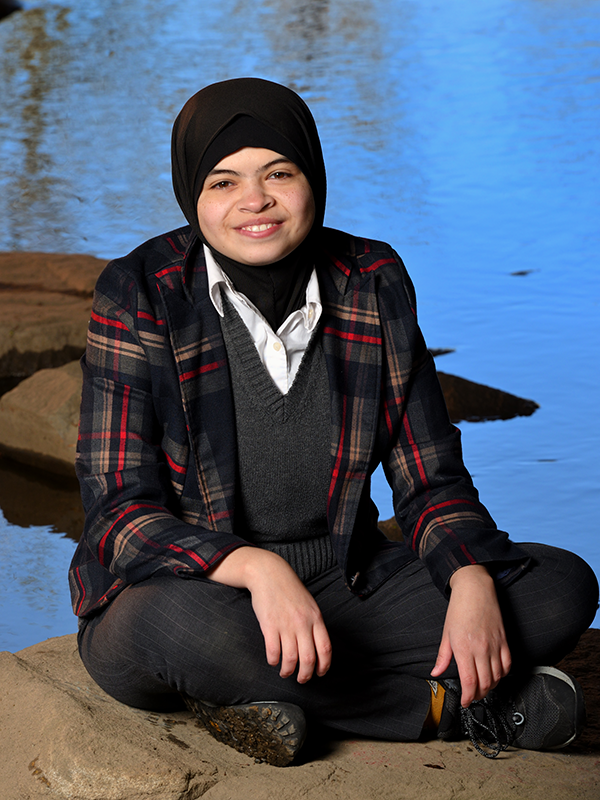Suhaylah Ahmad Ali

Michigan State University College of Natural Science
Dean's Research Scholar
In my own words
More about me
What is your hometown?
Pittsburgh, PA.
What is your major and anticipated graduation date?
Zoology B.S., Spring Semester 2026.
How did you decide to attend MSU?
I mainly wanted to experience university life outside of an urban setting and to go to a larger school that had lots of opportunities to explore my desired major through research, academics, and similarly engaged communities.
How did you select your major?
I was initially deciding between Fisheries and Wildlife and Zoology for my love of studying exotic wildlife. What drew me to zoology was its focus on studying animal biodiversity in and out of Zoos and Aquariums, which served as a powerful inspiration to me because I visited them often while growing up in a city with limited access to natural green spaces.
Can you describe your research?
My research is focused in understanding the life cycle of a parasite that transfers between two hosts, with the potential to spread disease in the kidneys of freshwater salmonid fish species, raising their mortality rate and threatening their populations. In my project, I am studying the possible first hosts of the parasite, because although it is currently identified through a specific freshwater filter feeder, the extent of what kinds of filter feeders may be able to host and transmit the parasite is unknown.
What is the societal impact of your research?
Fishing is a major recreational sport and industry in Michigan. Not only that, but the Michigan Department of Natural Resources monitors the migratory salmonid species to ensure their populations are at a sufficient level for the health of the Great Lakes ecosystem. If the parasite transfers between wild and hatchery raised fish, or if their prevalence is raised too high due to raising temperatures, the mortality of these fish populations may increase due to kidney disease caused by the parasite, which threatens the surrounding fish industries and the health of the aquatic ecosystems.
How has your undergraduate experience been impacted by this experience?
One thing was I didn’t realize how powerful research felt until I was actively participating in it. I may be working in a lab that is focusing on a very specific parasite the infects a specific family of fish, but after learning about the major investigative questions that drove the research, it became so much easier to see the big picture. I could make a positive impact by studying biodiversity, aquatic fish health, and wildlife diseases.
Of everything you have experienced at MSU, what has surprised you the most/what is something you never expected?
After hearing so many horror stories, I never expected that my first roommate, who seemingly lived an opposite life to me with different professional goals, would become a close friend, continuing roommate, and supporter of my passion for studying wildlife.
If your little brother/sister was coming to MSU, what is one piece of advice you would give them?
There are so many resources and communities at MSU to support your major. Just find the field you love studying and make yourself known – but always remember to try new things.
What person or people have inspired you the most?
First and foremost, the people that continue to inspire me are every single one of my family members at their own stage of life with their own diverse experiences. Because of them, I approach life with an incredibly open mind. A more recent source of inspiration is Robert Sapolsky and the fact that I admire his career path, often hoping my future career might end up as ambitious or adventurous.
What person would you most like to meet (living or dead)?
Robert Sapolsky, Jane Goodall, or David Attenborough
On a Saturday afternoon, what would we likely find you doing?
Either with a sketchbook and pencil drawing animals, or with the latest autobiography about some biologist.
What major research breakthrough of the next decade (not your own, but overall) do you think we will see?
Developing a widespread, energy renewable, and cost-effective way of composting single use plastics.
What are your plans after graduation?
Realistically, depending on my financial capabilities, I will either jump straight into grad school to study wildlife diseases, or find an entry level position as a zoologist/wildlife biologist.
Where do you see yourself in 5 years?
Either still in school, studying wildlife diseases as a graduate student, or a fresh and inexperienced wildlife biologist monitoring wildlife population in a national park.
Where do you see yourself in 25 years?
I would love to aim for veterinary school later in life, studying exotic medicine, maybe working on conservation projects by the coast, or becoming a professor at a university, teaching, and leading wildlife study abroad programs.
What are some of your favorite MSU memories?
When I was given the honor of being the primary caretaker of a group of week-old baby chickens during spring break of my freshman year.
What do you see as the importance of this scholarship to you personally and to your future career?
As a crucial part of all research, the Dean’s Research Scholar’s program provides me with more opportunities to communicate the value of my research to others. It also allows me to connect with students in vastly different but equally impactful and innovative fields to expand my interests past my own research. I may now be studying a small bubble in a big world, but developing my ability to see the big picture and how it matters on a larger scale will be a powerful guide for me in a future research focused career.